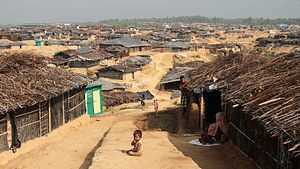In a recent statement, the United Nations requested $920 million to support the nearly 1 million Rohingya refugees who have settled in Bangladesh after fleeing from increased violence in Rakhine, Myanmar, since 2017.
More than half the money in the 2019 Joint Response Plan (JRP) proposed by the United Nations aid agencies and NGO partners will go toward providing critical aid to the refugees in the form of food, water, sanitation, and shelter. The remainder will fund health services, protection services including child protection, site management, education, nutrition, and addressing sexual and gender-based violence.
Through the aid received in 2018, the joint statement notes that food security in the camps improved; immunization coverage rose to 89 percent; acute malnutrition dropped below the emergency threshold, from 19 percent to 12 percent; and 40 percent of women were delivering their babies in health facilities, up from the initial 22 percent.
Nevertheless, the 2018 JRP funding fell short by 31 percent — receiving just $655 million of the $950 million originally proposed.
“Our humanitarian imperative today is to stabilize the situation of stateless Rohingya refugees and their Bangladesh hosts,” said the UN High Commissioner for Refugees Filippo Grandi in the UN statement.
The 2019 JRP report notes that the Rohingyas remain in an “extremely precarious situation” as long as the “root causes” of their displacement remain unaddressed in Myanmar. In the joint statement, Grandi called on Myanmar to address these issues.
“I repeat my call to Myanmar to take urgent action to address the root causes of this crisis, which have persisted for decades, so that people are no longer forced to flee and can eventually return home in safety and dignity,” he said.
Most Rohingyas identify themselves as Sunni-Muslim in a predominantly Buddhist Myanmar. Before the military crackdown of August 2017, the Rohingyas comprised one-third of the population in Rakhine, Myanmar.
Since independence, the Burmese government has institutionalized discrimination against the Rohingyas, further worsened under the military rule. The Rohingyas are not recognized as citizens of Myanmar, effectively rendering them stateless under the Citizenship Act. Myanmar prefers to refer to the Rohingyas as Bengalis, and identifies them as illegal immigrants. Numerous restrictions have been placed upon their education, movement, marriage, family planning, employment, and religious choice.
Since 2017, over 745,000 Rohingyas have fled Myanmar and settled in Cox’s Bazar, where 200,000 other Rohingyas were already residing after fleeing other waves of violence in the region.
The 2019 JRP, proposed by 132 partners including UN agencies, international and national NGOs, and government bodies, is the third such outline by the UN. It focuses on three main strategic objectives: delivering protection, providing life-saving assistance, and fostering social cohesion.
In October 2018, Marzuki Darusman, chair of the UN fact-finding mission on the Rohingya exodus, called the anti-Rohingya campaign an “ongoing genocide” in Myanmar. At various instances UN officials have proclaimed the military’s violence to be genocide and called for key government officials to be prosecuted under that charge.
In January 2019, Yanghee Lee, the UN special rapporteur on human rights in Myanmar, called for the prosecution of Min Aung Hlaing, Myanmar’s commander-in-chief for “genocide” against the Rohingyas.
Lee’s statement was supported by the findings of the UN fact-finding mission last year, which pushed for charging the army chief and five other generals for “gravest crimes under international law” after finding that the August 2017 military crackdown was orchestrated with “genocidal intent.”
The 440-page report released by the UN documented thousands of civilian mass killings, forced disappearances, mass gang rapes, and the burning of villages. It presented disturbing accounts of women tied by their heads and hands to trees and raped, young children pushed back inside burning houses as they tried to run, and landmines placed at village escape routes to kill those that attempted to flee.
Bangladesh and Myanmar have agreed to voluntarily repatriate the Rohingyas since November 2017 but the plans have been stalled multiple times by the Rohingyas, the UN, and aid groups, all fearing the safety of the Rohingyas in Myanmar.
The March 2018 JRP report by the UN found that more than 77 percent of the refugees feel that they do not have enough information to make good decisions about their voluntary return.
The 2019 JRP also includes support for over 330,000 vulnerable Bangladeshis in host communities that have been affected by the refugee settlement.
The displacement of Rohingyas has almost tripled the total population of Ukhiya and Teknaf Upazilas, where the 34 congested Rohingya camps are based. This has had a significant economic and environmental effect on the local Bangladeshi population. An earlier United Nations Development Programme (UNDP) study found that over 4,300 acres of hills and forests in Cox’s Bazar were razed to build the refugee settlements.
Some researchers have urged Bangladesh to seek compensation from Myanmar for the socioeconomic and environmental cost of hosting almost a million Rohingyas. Researchers from Swinburne University of Technology argue that Myanmar owes $6 billion in damages to the Rohingya and the Bangladesh government in a recent study titled “Rohingya Mass Exodus: Who Should Pay Compensation and How Much?”
The research concluded that Bangladesh should receive $2.6 billion of the total amount for the economic cost of the crisis and environmental degradation.
The rest should be awarded to the Rohingyas for “economic and psychological losses,” said Dr Mohsin Habib, one of the researchers and director and senior lecturer of the International Business Program at Swinburne, according to the Dhaka Tribune.
Bansari Kamdar is a freelance journalist based in Boston. She writes on South Asian political economy, gender and security issues. Her work has appeared in CNN-News18, The Quint, The Wire, and The Diplomat.

































